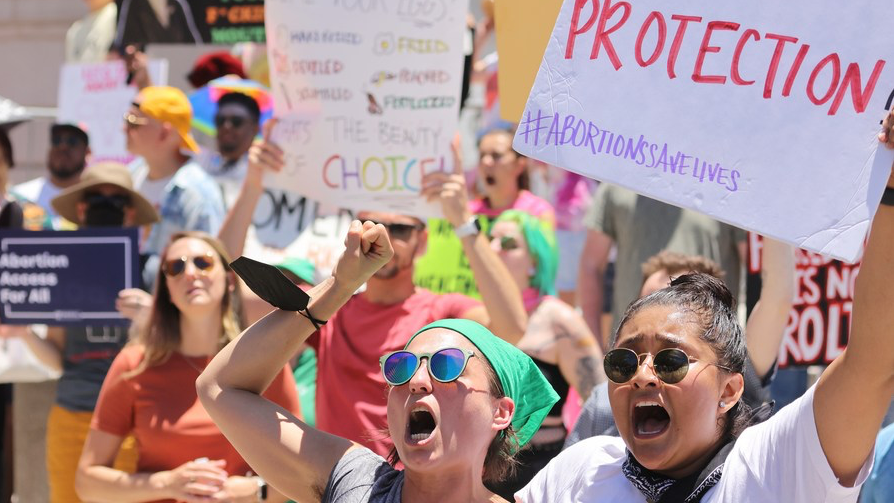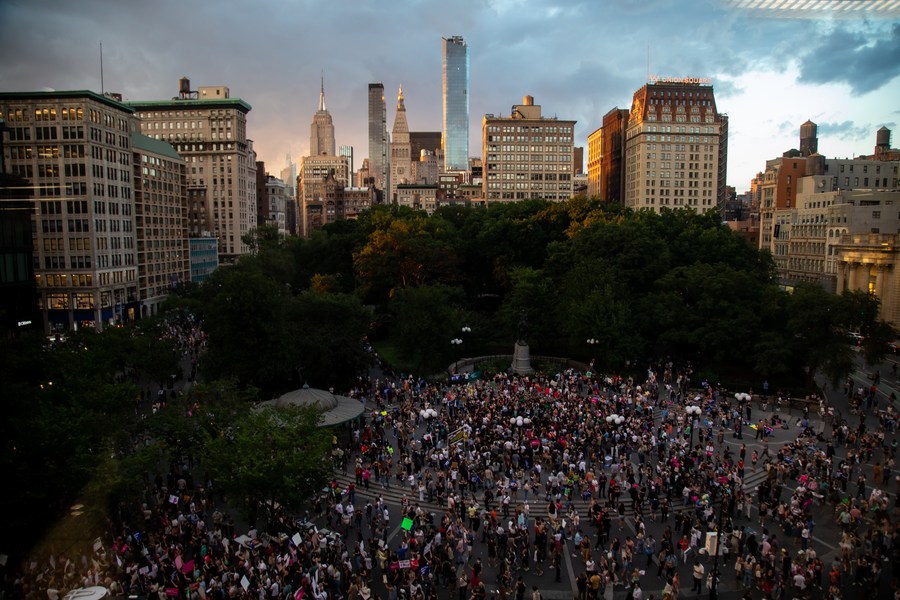
Protesters rally outside the Los Angeles City Hall, downtown Los Angeles, California, the United States, June 25, 2022. /Xinhua
Protesters rally outside the Los Angeles City Hall, downtown Los Angeles, California, the United States, June 25, 2022. /Xinhua
Editor's note: William Jones is the former White House correspondent for EIR News and a non-resident fellow of the Chongyang Institute for Financial Studies. The article reflects the author's opinions, and not necessarily those of CGTN.
The U.S. Supreme Court on June 24 effectively threw out the legislation that had given American women the right to have an abortion, stemming from the Supreme Court decision of 1973 on the Roe v. Wade case. Decisions on abortion procedures are generally decided by the individual state governments, but Roe v. Wade meant that no state could abolish abortions completely. That has now changed, and much has already been done over the last five years in many states to increase the restrictions on abortions. Now states will have the option to abolish abortions altogether within their states. Now the procedures of abortion will be more difficult for women to access and they may have to find another state – or even another country – where they can have their abortions.
The Supreme Court's decision has created a firestorm, with demonstrations all over the country, some protesting it and some greeting it. There have even been violent incidents in reaction to the decision. It also upsets any calculations with regard to the upcoming congressional elections. Republicans were generally optimistic in making gains – or even taking over – the House and the Senate. Joe Biden's continued obsession with sending weapons to Ukraine and sanctioning Russia, which is siphoning off funds for domestic needs and sparking a rampant inflation, will only get worse by November this year, when congressional elections will be held.
But with the reversal of Roe, a good portion of those trending Republican, in particular, the women, may now be leaning in the opposite direction. Roe v. Wade was considered sacrosanct for a long time in spite of the fact that a portion of the Republican Party, particularly the religious fundamentalist wing, maintained an ongoing campaign to upset the 1973 decision. The recent influx of conservative justices on the Supreme Court, several appointed by President Trump, swung the court in the direction of the "pro-life" Republicans, leading to the present reversal. Although Trump publicly is praising the decision calling it a "victory for life," privately he expressed worries, when the decision was prematurely "leaked" to the press, that this would hurt Republicans in upcoming congressional elections. The Trump victory in 2016 was largely dependent on the vote of women, who may now be disillusioned with the way things worked out.

A protest in Union Square after U.S. Supreme Court made decision to overturn Roe v. Wade, in New York, U.S., June 24, 2022. /Xinhua
A protest in Union Square after U.S. Supreme Court made decision to overturn Roe v. Wade, in New York, U.S., June 24, 2022. /Xinhua
While there are cheers and celebrations among the supporters of this decision, many Republican candidates are also getting worried. While the decision will certainly shore up their "core support" among the fundamentalists and other conservatives, in most congressional districts there is an absolute need to attract the "shifting middle," those people who are not politically committed to one party or the another, for an election win. This will now become more difficult for Republicans. For many people who are not very happy with the record of President Biden, they may decide to maintain a Democratic legislature in order to prevent the Republican Party that they fear will further limit the abortion rights.
With a view toward the next presidential elections, those concerned with the conservative shift in the Supreme Court may vote Democratic simply in the hope that the next president, whoever he or she may be, will appoint more liberal judges, who would be more willing to bring back the right of women to choose. Both sides are mobilizing frenetically for the upcoming battles – in the state legislatures and in the congressional elections. The anti-abortion groups are gearing up to pass stricter laws against abortion in the states – and even banning it entirely. Those supporting a "woman's right to choose" are equally intent on preventing that from happening. The political season will now begin in earnest focusing on the upcoming state and congressional elections. The real issue is whether abortion or the economic crisis will have the upper hand in people's decisions.
One thing is absolutely sure. The Supreme Court's decision has further agitated the domestic situation in the United States. The debate will become more heated and people will become angrier. Street confrontations and even terrorist actions are not to be excluded. That hope of "reconciliation" that had been a hallmark of the Biden election campaign seems to be more distant than ever. We find ourselves in that unhappy situation, characterized by Abraham Lincoln as a "house divided" and more divided than ever. Is there someone out there who can bring us together? There may well be, and hopefully there is, but he or she is certainly not yet on anyone's horizon.
(If you want to contribute and have specific expertise, please contact us at opinions@cgtn.com. Follow @thouse_opinions on Twitter to discover the latest commentaries on CGTN Opinion Section.)

